A courageous journalist was murdered after warning us twenty years ago about the Russian method of war.
-
Spring 2022
Volume67Issue2
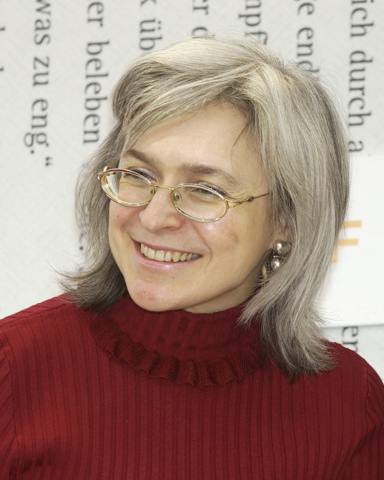
Editor’s Note: Russian troops tortured journalist Anna Politkovskaya for her writings about the suffering of Chechnyan civilians. In 2006 she was shot dead in an elevator in her Moscow apartment building. Some of Politkovskaya's vivid accounts of the horror wrought by Russia’s two wars in the mostly Muslim province were compiled in A Small Corner of Hell: Dispatches from Chechnya, translated by Alexander Burry and Tatiana Tulchinsky (University of Chicago Press). Politkovskaya was highly critical of Putin’s actions and those of the pro-Moscow dictator Akhmad Kadyrov and his son Ramzan.
The war began the way wars usually do, with the bombing of villages and cities, which led to torrents of refugees. Thousands of people, grabbing their children and elderly, fled wherever their feet would carry them. They were coming and going every which way, a trail of people many miles long following the main highway of Chechnya, the Rostov-Baku Federal Route. But this trail got bombed too.
September 1999. We are lying on withered autumn grass. To be more precise, we want to lie on it, but for most of us, all that’s left is the dusty Chechen ground. There are too many of us – hundreds, and there are not enough amenities for everyone.
We are the people caught in the bombing. We didn’t do anything wrong; we were just walking toward Ingushetia along the former highway, which is now all torn up by armored vehicles.
Grozny is behind us. We run as a herd from the war and its battles. When the time comes, and you have hit the ground face down, assuming a fetal position, trying to hide your head, knees, and even elbows under your body – then a kind of false, sticky loneliness sneaks up on you, and you start to think: “Why are you crouching? What are you trying to save? This life of yours that no one but you cares about?”
Why is it false? Because you know perfectly well that this isn’t really true: You have a family, and they are waiting and praying for you. And it’s sticky because of the sweat. When you’re clinging to life, you sweat a lot. Some people are lucky, though. When they feel that death is near, all that happens is that the hair rises on their heads.
Still, there is loneliness. Death is the one situation where you can never find companionship. When the diving helicopters hover over your bent back, the ground starts to resemble a death bed.
Here are the helicopters, going for another round. They fly so low that you can see the gunners’ hands and faces. Some say that they can even see their eyes. But this is fear talking. The main thing is their legs, dangling carelessly in the open hatches. As if they didn’t come to kill, but to let their tired feet get some fresh air. Their feet are big and scary, and the soles almost seem to touch our faces. The barrels of their guns are squeezed between their thighs.
We’re frightened, but we all want to see our killers. They seem to be laughing at us crawling comically down below – heavy old women, young girls, and children. We can even hear their laughter. But no, this is just another illusion; it’s too noisy to hear that. Automatic weapon fire whistles in the air around us, and someone always starts to wail. Has anyone been killed? Wounded?
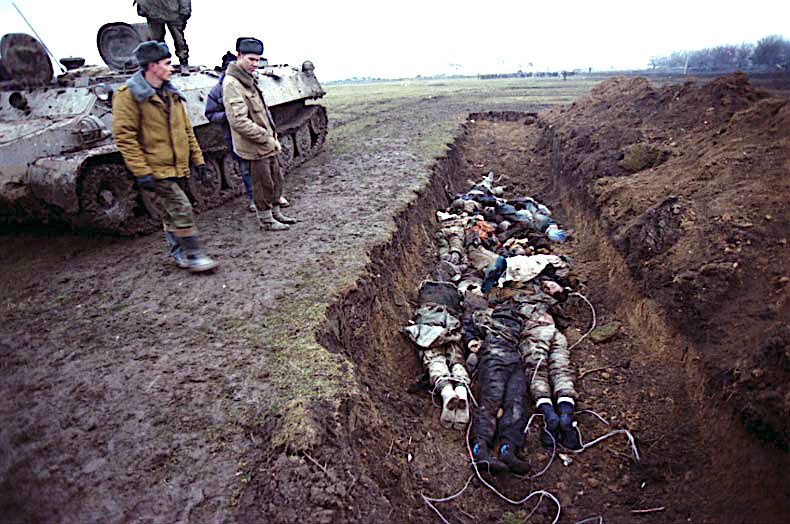
“Don’t move. Don’t raise your head. That’s my advice,” a man next to me says. He dropped to the ground right where he was, in his black suit with a white shirt and black tie.
“I’m all numb,” pipes up a female in front, gingerly shifting a bit. “When will this all end?”
Still, there is loneliness. Death is the one situation where you can never find companionship. When the diving helicopters hover over your bent back, the ground starts to resemble a death bed.
Here are the helicopters, going for another round. They fly so low that you can see the gunners’ hands and faces. Some say that they can even see their eyes. But this is fear talking. The main thing is their legs, dangling carelessly in the open hatches. As if they didn’t come to kill, but to let their tired feet get some fresh air. Their feet are big and scary, and the soles almost seem to touch our faces. The barrels of their guns are squeezed between their thighs.
We’re frightened, but we all want to see our killers. They seem to be laughing at us crawling comically down below – heavy old women, young girls, and children. We can even hear their laughter. But no, this is just another illusion; it’s too noisy to hear that. Automatic weapon fire whistles in the air around us, and someone always starts to wail along. Has anyone been killed? Wounded?
“Don’t move. Don’t raise your head. That’s my advice,” a man next to me says. He dropped to the ground right where he was, in his black suit with a white shirt and black tie.
“I’m all numb,” pipes up a female in front, gingerly shifting a bit. When will this all end?”
“Shut Up, Bitch!”
A downed helicopter served both as the reason to start a blockade and the pretext to continue it indefinitely. And it’s not important who organized it, only who’s going to have to pay for it.
On the night of September 17, Grozny was rocked by terrible purges. Men were grabbed from their homes, and the howls of women for their abducted sons, husbands, brothers, and neighbors rang out over the whole city, mixed with rounds from automatic weapons and the thunder of mortars.
Around 6 A.M. on the eighteenth, the blockade dawn displaced the night, saturated with firing. Armored vehicles covered with chilled, mean, sleep-deprived people in black masks awaited the Grozny residents as they crawled out onto the streets out of sheer necessity.
And there was only one necessity: some people absolutely had to go to work – doctors and nurses, for example. The sick were waiting.
I make a tiny peephole in the curtains. My hostess pleads with me in a whisper not to reveal myself. If the masks see us, they’ll shoot.
I see an empty street past the window through the peephole. It is Staropromyslovsky Road. About fifteen feet from my peephole is an armored vehicle. And another one thirty feet away. They’re everywhere you look. Soldiers sitting in the armored vehicle curse nastily and pointlessly. Some of them are obviously not sober. Others gulp water from plastic bottles, a sign of a hangover.
A young nurse cautiously moves along the road with short steps, looking back and stopping often. She’s wearing a white coat, which of course she put on so the soldiers can see that she’s a medical worker and let her go. She’s going to work; the Ninth Grozny Municipal Hospital is right nearby. Everyone in Grozny, both soldiers and civilians, knows that the Ninth Hospital is the only one that hasn’t stopped working under any circumstances. The nurse has a few yards to go. She puts a foot forward and waits to make sure they don’t shoot. Only then does she put the other one forward, her knees bent in fear. It looks like ballet, but it’s real life.
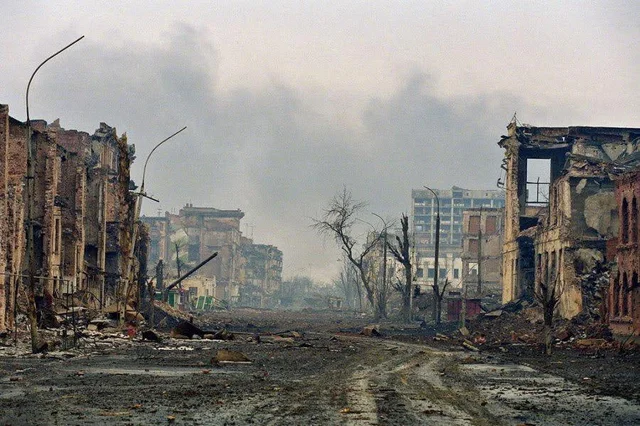
In this manner. the nurse crawls rather than walks. The soldiers are obviously amused by this. They curse even harder.
The nurse is completely alone on the road, except for those waiting for her in the armored vehicle, who have already drawn a bead on her, and those behind. who also have their finger on the trigger.
Finally they get bored. “Stop!” comes the bloodcurdling yell from the soldiers behind her. And suddenly, because of this cry, the girl becomes bolder. She straightens her knees, and quickly and decisively goes to the side. She is accompanied by a round of submachine gun shots.
It becomes quiet again on Staropromyslovsky Road. Then a group of about ten women appears. Slowly, groping, they try to move forward in the direction of the Lenin district military command headquarters, the gates of which are right across from my peephole. They are mothers, wives, and sisters of men arrested in the night purges. They’re going to the command headquarters to find out the ransoms for their men. You have to get there at dawn, before the arrested are taken somewhere else. If that happens, you might never find the person you’re looking for at all.
“Get out of here!” The mothers, wives, and sisters are met with a glob of spit from a man in the armored vehicle.
“But those men over there,” the women begin to explain, interrupting each other, and pointing in the direction of another armored vehicle. “They told us to come here . . .”
“Get the hell out of here!” The masked men leer like hungry wolves, baring their teeth. “You hear? Get out!”
And more cursing. The women fall into hysterics.
“You’re killing us . . . You’re taking away our men . . . Thieves. Think of your own mothers . . .”
“Shut up, bitch!” howl soldiers from the armored vehicle, heating up with their cursing. “We told you, get out of here! You can’t live here. It’s our territory.”
The women, sobbing, back away. They say:
“Shut up, bitch!”
“Where can we go?”
“Nobody wants us.”
A Village That No Longer Exists
There is no person who would claim that the grief of Katyn, a town near the Russian-Belarussian border where 22,000 Poles, Ukrainians, and Jews were murdered by the Soviets in 1940, is greater than the horror of Guernica. You can’t use scales or a ruler to measure suffering. Everyone has his or her own pain, and such pain is worst for whoever experiences it.
The second Chechen war has added a few new pages to the country’s history, comparable to both Guernica and Katyn in terms of the number of victims, and the ruins, bloodshed, and consequences for the whole world. And it is not at all important that no one has recognized this yet; the time will come when everyone will speak of it.
One of these pages is about Komsomolskoe.
Komsomolskoe used to be a big village in the Urus-Martan district, a little over four miles from the district center. It had thousands of residents, a hospital, a club, stores, lovely hilly, winding streets, and a charming Alpine view of the mountains.
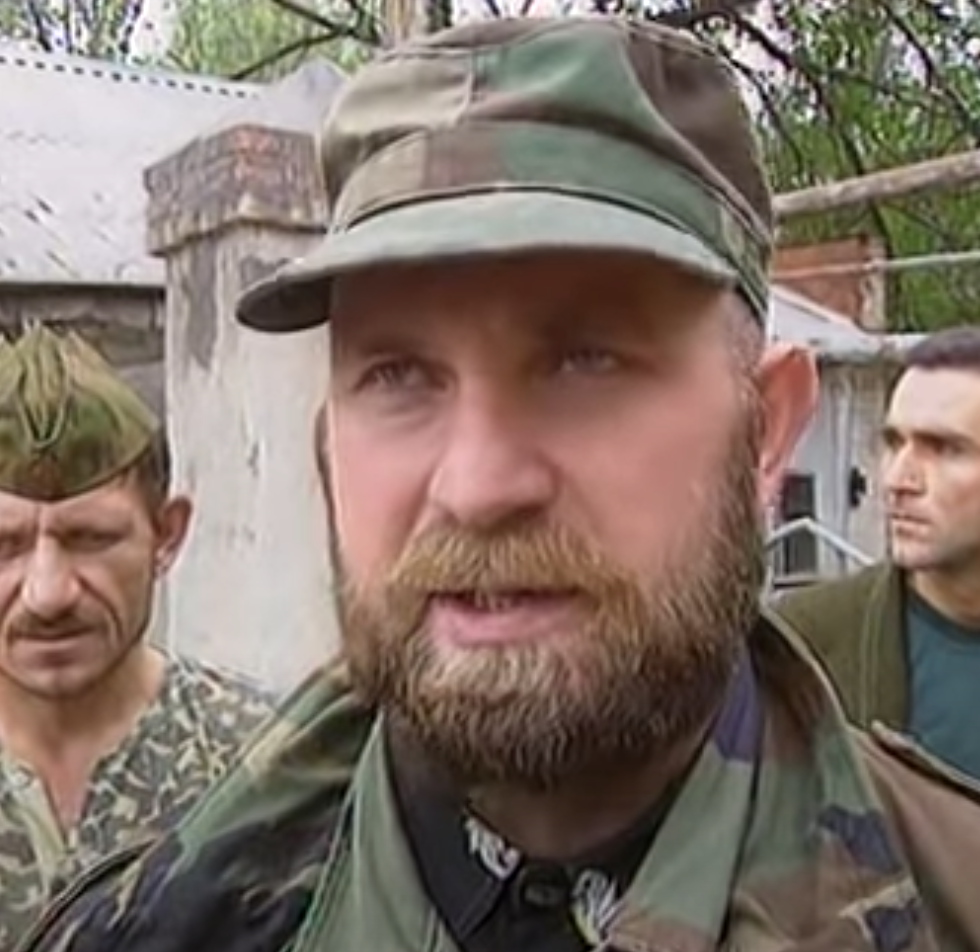
A man named Ruslan Gelayev, a prominent commander in the Chechen separatist movement, grew up in this village. And this, in essence, determined the course of the village’s history and sealed the fate of its thousands of residents.
At the beginning of February 2000, after field commander Gelayev’s detachment had entered Komsomolskoe, the Federal troops completely destroyed the village. The siege lasted for one month, after which both Gelavev and the Feds went “home,” leaving behind a monstrous conglomeration of burnt houses, ruins, and new graves at the cemetery.
A Year and a Half Later
If you walk along the former Tsentralnaya Street, a feeling of un-reality brought on by everything that has taken place here will overwhelm you.
On the one hand, it is a lifeless desert devoid even of chirping birds, so it doesn’t have the natural soundtrack that we are used to. On the other hand, it looks like the setting for a horror film, with eerie voices heard from time to time.
To reach these voices, you have to go uphill. It seems that there was a street here in the good old days; nowadays, you can only see overgrown, untidy bushes sticking out everywhere, bashfully covering some background ruins.
A man in threadbare clothes appears on the well-trodden path. He is as thin as a Buchenwald prisoner. It is probably because of the tuberculosis – there are many cases now in Chechnya.
“Do you live here?”
“Yes. This used to be Rechnaya Street.” He waves in the direction of the bushes he came out from. “Who are you looking for?”
“Anyone who lives here.”
“That would be me. There’s no one else on this street. They say 150 families came back to the village. But they are all homeless.”
“Is the head of administration here? The village council?”
“No, we’re on our own.”
“What do you mean?”
“There just aren’t any authorities here. They probably think our village doesn’t exist at all. For them, Komsomolskoe has been wiped from the map – otherwise, they’d remember about us, ask how we’re doing.”
“Can you show me your house, then?”
“I already told you, I don’t have any.”
“So where do you live? It’s fall now.”
“In a barn.”
The man’s name is Mohammed Dudushev. It turns out that he was born the same year as me, but he looks like an old man. Mohammed has a big family – his wife Liza, six kids, and his mother. The family is crammed into a tiny brick hut – a “barn” – they built this past summer. Their house is nearby; it was destroyed by a direct hit. The ruins are lovingly covered with the thick blue plastic that was once dispensed to the village’s residents from the United Nations.
“We wish they’d help us with construction materials. We can’t build it all by ourselves.”
Fire at the Boy!
“I was glad when they took us to be shot.” Mohammed Idigov, a sixteen-year-old tenth-grader at the village’s High School No. 2, has the eyes of a grown-up man. Combined with his teenage angular build and awkwardness, this looks strange. As does the calm way in which he is talking about what happened. During the twentieth purge, they tortured him with electric shocks at the “temporary filtration point” set up at the edge of the village, along with adult men.
On the morning of February 1, the worst day of the purge, Mohammed was arrested at his home on Nagornaya Street, thrown into a military KAMAZ truck like a log, and then tortured while the commanding generals watched. General Moltensky himself seemed to loom nearby – at least, that’s what Mohammed thought.
“How come you were glad? What about your parents? Did you think about them?”
He furrows his eyebrows like a child, fighting back his tears: “Other kids get killed too.”
A pause. The boy’s father, a retired Soviet Army officer, stands nearby. He spreads his hands the whole time, repeating, “How can this be? I myself – I was in the army. How can they do this?”
“It was cold,” Mohammed continues. “They made us stand facing the wall for several hours, with our hands raised and our legs apart. They unbuttoned my coat, pulled up my sweater and started to cut my clothes with a knife from behind, down to my body.”
“Why?”
“So that I’d be even colder. They beat us all the time. Whoever passed by would hit us with anything he had. Then they separated me from the others, put me on the ground and dragged me around in the dirt by my throat.”
“Why?”
“To humiliate me, I think. Then they took me to be interrogated. There were three men asking questions. They didn’t introduce themselves. They showed me a list and asked, ‘Do you know which of these are militants? Who’s treating them? Who’s the doctor? Where are they staying for the night?”
“And what did you say?”
“I said I didn’t know.”
“And what did they do?”
“They asked, ‘Do you need some help?’ And they started to torture me with electric shock – that’s what they meant by ‘help.’ They attach the wires to you and turn the handle. They probably made this device themselves, from a telephone. The more they turn it, the stronger the shock. During the torture they asked me where my Wahhabi brother was.”
“Is he really a Wahhabi?” I ask.
“No. He’s just my older brother. He’s eighteen, and my father sent him away so they wouldn’t kill him the way they kill a lot of young guys in the village.”
“And what did you tell them?”
“I kept silent.”
“And what did they do?”
“They gave me more shocks.”
“Did it hurt?”
His head on his thin neck slumps below his shoulders, down to his angular knees, as he crouches on the floor. He doesn’t want to answer. But I need his answer, so I insist:
“Did it really hurt?”
“Yes.” Mohammed doesn’t raise his head, speaking almost in whisper. His father is nearby, and the boy doesn’t want to appear weak in front of him.
“That’s why you were happy when they took you to be shot?”
He shudders as if he has a high fever. Behind his back I can see a bunch of medicine bottles with droppers, syringes, cotton swabs, and tubes.
“Whose are those things?”
“Mine. They beat me so hard, they damaged my kidneys and lungs.”
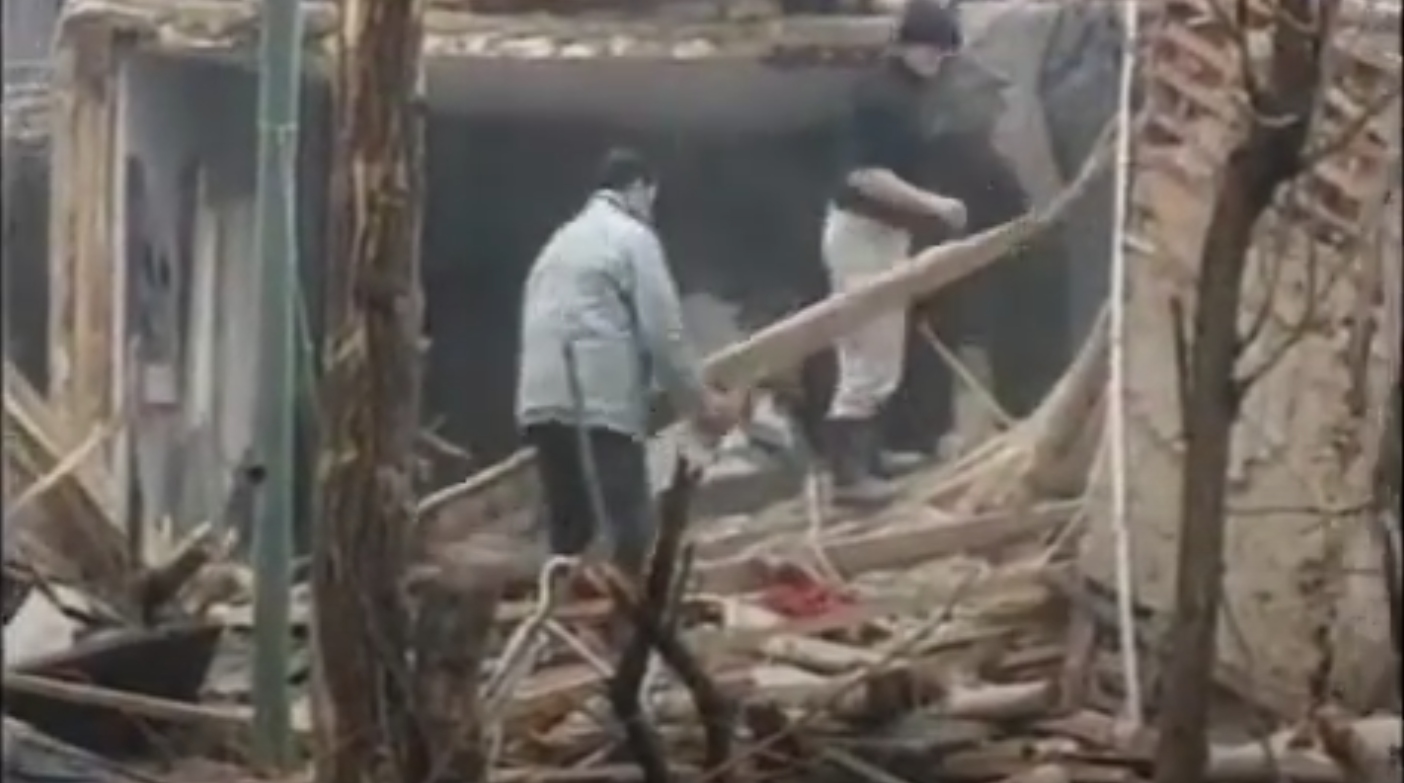
What Are the Rules of the Game?
I’m at another house in Goity, a rural town in the Urus-Martanovsky District in Chechnya, in the evening. The corpse of a person kidnapped by soldiers has just been handed over to this family.
I’m speaking with the twenty-year-old Salambek, a nephew of the dead. We’re talking about what to do now, the meaning of everything that has happened, and what young Chechens think about all this. Life has taught Salambek to be silent always, under any circumstances. And he’s as taciturn as a concentration camp prisoner of many years.
“What do young people in Goity do these days, besides hiding from the Feds? Eighteen- to twenty-five-year-old guys can’t stay at home for three years in a row every day just so everyone knows that they’re not militants, can they?” I ask.
I hope that Salambek is just joking. But he isn’t. In general, young people here rarely laugh – they’ve gotten out of the habit. Look how many fresh graves there are in the Goity cemetery. Salambek is perfectly serious. His impassive, motionless face with a grimace of tortured hopelessness, and his large eyes, above his wide, frozen cheekbones, stare stubbornly and reproachfully.
“What can we do besides dying?” answers Salambek.
Most of the people in Chechnya who have survived up to this moment are full of despair. They live in this despair, this sheer hell, like in a dreary starless night. This is the main result of the total lawlessness imposed on the population in the course of the second Chechen war. You take your life into your hands if you leave the village, or even if you just walk around the village. Either way, you could be arrested.
The Federal “broom” sweeps young people away every day. Visiting Urus-Martan is even more out of the question; the road is filled with checkpoints, and any one of them can become the last in your life. Examples abound.
Before the war, approximately forty thousand people lived in Goity. Now there are no more than fifteen thousand. Everyone left if they could, to save their children. And there’s nothing here for those who remained, except for the infamous Chechen “package”: Federal raids, night purges, marauding, morning discussions of who was taken away this time and what was stolen along with them, regular burials, stories about the ways those who survived were tortured, and whose corpses looked like what.
There is no library or movie theater, although the buildings remain.
“When was the last time a movie was shown here?”
“When I was little, before the first war.”
“Gross Grozny”
Malika lives in Grozny Neighborhood No. 1, on Kirov Street, in a five-story building, in a wing with no men. It was around two o’clock at night when they started banging on the door: “Open up, you bitches, this is a purge!”
They opened the door, of course – there was nothing you could do.
Just so long as they didn’t burst the door open. A group of young men in uniforms and masks and (as became clear from their conversation) a mixture of Chechens and Russians, came to rob the building, which had already been robbed several times.
Three of Malika’s female relatives were sleeping in her apartment. One of them was fifteen. The gang acted as if they were going to rape her, and yelled at the others: “If you don’t do what we say, we’ll rape her to death.” They grabbed Malika by her hair and dragged her up the stairs to knock on other people’s doors and ask them to open up for a neighbor.
Everything ended in marauding and blood. The women who had spent that night in these apartments were mercilessly beaten on their legs, kidneys, and heads.
“Did they rape anyone?”
Malika is silent. Those who brought her here, the beaten women who opened their doors when she knocked, are also silent. Their silence is too stubborn.
The bandits’ bacchanalia on Kirov Street lasted until five in the morning. In Grozny they’re used to the marauders leaving the places where they’re “partying” by six, before the end of the curfew.
“Look at the numbers!” the doctors say. “From June 1 to September 18, 2001, we received 1,219 patients here at the hospital, including outpatients. Of those, 267 had wounds from firearms or mine explosions. Most of them are victims of these night robberies.”
To find out what’s going on in the city, you have to go to the hospital. This is where the final acts of all these dramas and tragedies take place. So while those in the administration who are being paid to “construct peace” in Chechnya blabber nonstop about “peacetime” Grozny, new patients “wounded by firearms” are brought every day to the hospital of war-stricken, bandit-ridden Grozny.
The war in this city has depraved everyone weak enough to give in to it. Nighttime criminals attack the ruined homes of people who are already wretched enough as it is. On the one hand, this criminality is led and encouraged by Federal servicemen. Without their consent and support, today no bandit would be capable of wandering the streets during curfew, let alone shooting, robbing, and raping. However, it also requires the active participation of Chechens.
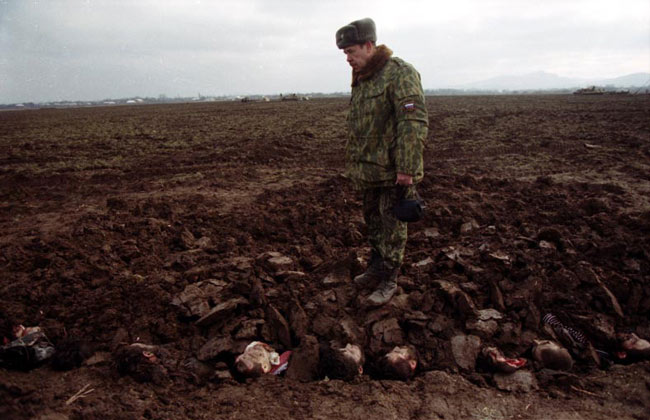
By the beginning of the third year of the war, it turns out that the gangs combing the ruins at night are a fraternity of criminals from the Chechen ranks, mixed with servicemen of the same stripe who are here “on duty” And they don’t give a damn about their ideological and national differences, or the fact that they belong to opposing sides. I’m sure that, even if they announced the end-of-war operations and the withdrawal of troops tomorrow, Grozny would remain under the heel of criminals. And who knows when it would be able to throw it off? It’s easy to start a war, but it’s almost impossible to fish out all the monsters that it begets.
“Gross Grozny”: that’s how residents of Grozny refer to their once-beloved city. And these two words reflect more than just pain from the loss of streets and squares that have been turned into ruins. There is also a horror of the future, since the present has sunk into the darkness of the outright banditry that is the main result of the war.

